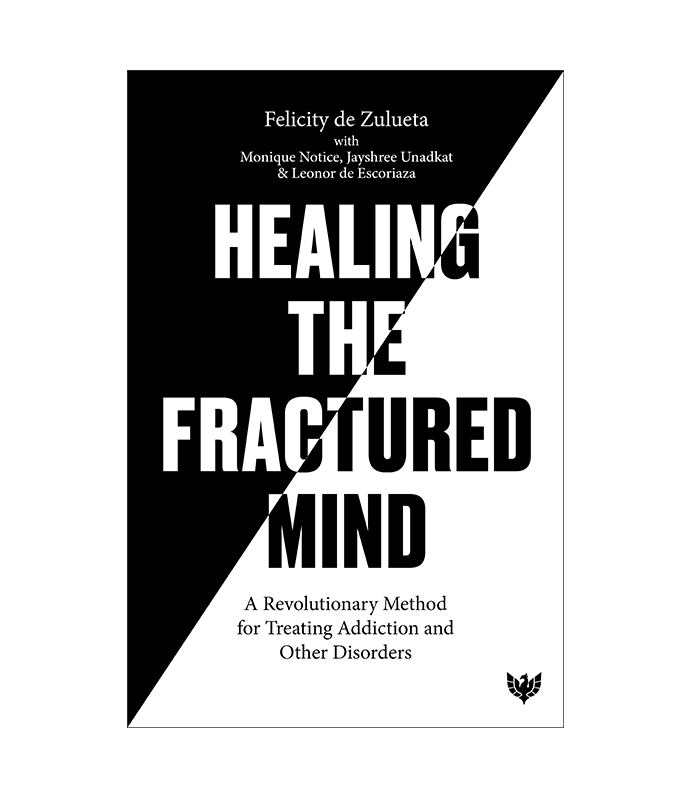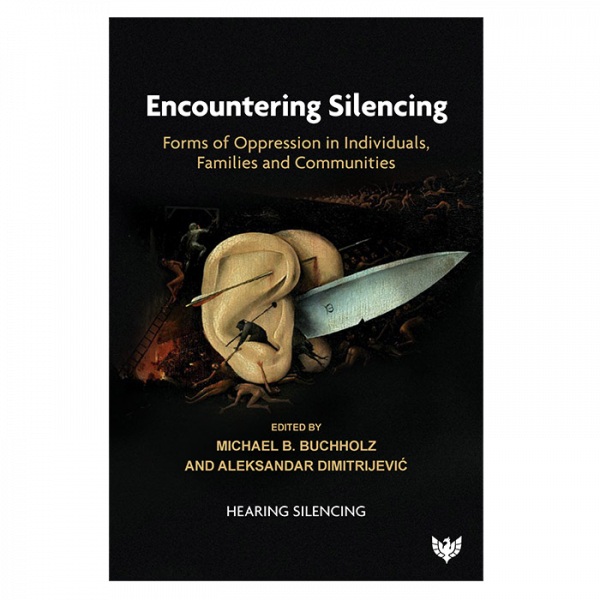Healing the Fractured Mind: A Revolutionary Method for Treating Addiction and Other Disorders offers the reader a journey into the human mind in search of an answer to the human paradox: how can we be both so loving and also so destructive, to ourselves and to others? The answer: there is no such thing as a human mind; there are in fact many different human mindsets. The way people feel and behave depends so much on how safe they felt in the hands of their parental figures and on the social context in which they are brought up in and live.
The human infant’s utter dependency on the mother in early development means that, should she become unavailable or threatening, the infant can neither fight nor flee but only freeze and thereby disconnect. It is at this point that the infant brain adopts an alternative developmental mode referred to as the “traumatic attachment” with the potential to develop different mindsets to ensure survival in a frightening world where others cannot be trusted.
For many, the cost of these ways of feeling, thinking, and behaving outweighs the benefit: they suffer from the effects of addiction, prolonged grief, domestic and other forms of violence, borderline personality disorder, developmental or complex trauma, and other ‘disorders’. Conventional treatment often fails to find a way out of these debilitating behaviours. Through years of research and clinical practice, Felicity de Zulueta has developed the Traumatic Attachment Induction Procedure (TAIP), a revolutionary method which can lead sufferers to full recovery. Through the TAIP, it is possible to gain access to the hitherto unconscious or implicit traumatic attachment and its accompanying internal working models.
Healing the Fractured Mind is an uplifting account of several clients’ therapeutic journeys from a past of chronic suffering and shame to the discovery of their true selves with the freedom to realise their long-hidden potential. It opens a new avenue of therapeutic practice and research in the field of early developmental trauma which could alleviate the suffering of so many. This book offers comfort and hope to therapists, the general public, and society as a whole by sharing the knowledge that these conditions are now treatable.





 Dr Felicity de Zulueta is an Emeritus Consultant Psychiatrist in Psychotherapy at the South London and Maudsley NHS Trust and an Honorary Senior Lecturer in Traumatic Studies at Kings College London. She developed and headed both the Department of Psychotherapy at Charing Cross Hospital and, later, the Traumatic Stress Service in the Maudsley, which specialises in the treatment of people suffering from complex post-traumatic stress disorder and other trauma-induced dissociative disorders. She has published papers on the subject of bilingualism and PTSD, BPD, and dissociative disorders from an attachment perspective and is the author of From Pain to Violence: The Traumatic Roots of Destructiveness (Wiley-Blackwell, 2nd edition, 2006) and is a founder member of the London ACEs Hub to promote the study of ACEs (Adverse childhood experiences) and the application of trauma-informed care. She is the recipient of the Sándor Ferenczi Award 2020.
Dr Felicity de Zulueta is an Emeritus Consultant Psychiatrist in Psychotherapy at the South London and Maudsley NHS Trust and an Honorary Senior Lecturer in Traumatic Studies at Kings College London. She developed and headed both the Department of Psychotherapy at Charing Cross Hospital and, later, the Traumatic Stress Service in the Maudsley, which specialises in the treatment of people suffering from complex post-traumatic stress disorder and other trauma-induced dissociative disorders. She has published papers on the subject of bilingualism and PTSD, BPD, and dissociative disorders from an attachment perspective and is the author of From Pain to Violence: The Traumatic Roots of Destructiveness (Wiley-Blackwell, 2nd edition, 2006) and is a founder member of the London ACEs Hub to promote the study of ACEs (Adverse childhood experiences) and the application of trauma-informed care. She is the recipient of the Sándor Ferenczi Award 2020. Monique Notice, MA, MBACP (Accred), is a psychotherapist in private practice with a very diverse demographic for short- or long-term psychotherapy. She has a background in nursing (RGN) and completed her master’s degree in psychodynamic therapy in 2012. In 2013, she became an accredited member of the BACP. She previously worked in an alcohol and drug agency that provide one-to-one and group therapy to people struggling with addictions. She joined the TAIP research group in 2012.
Monique Notice, MA, MBACP (Accred), is a psychotherapist in private practice with a very diverse demographic for short- or long-term psychotherapy. She has a background in nursing (RGN) and completed her master’s degree in psychodynamic therapy in 2012. In 2013, she became an accredited member of the BACP. She previously worked in an alcohol and drug agency that provide one-to-one and group therapy to people struggling with addictions. She joined the TAIP research group in 2012. Jayshree Unadkat, MBACP (Accred), is a psychotherapist in private practice working with culturally diverse individuals and couples, and also works in NHS mental health services. She completed her master’s degree in contemporary psychodynamic counselling/psychotherapy in 2013. She previously worked as a counsellor with adults struggling with addictions and also with young and older carers. She joined the TAIP research group in 2012.
Jayshree Unadkat, MBACP (Accred), is a psychotherapist in private practice working with culturally diverse individuals and couples, and also works in NHS mental health services. She completed her master’s degree in contemporary psychodynamic counselling/psychotherapy in 2013. She previously worked as a counsellor with adults struggling with addictions and also with young and older carers. She joined the TAIP research group in 2012.
Dr Suzanne Zeedyk, developmental psychologist, and Honorary Fellow, University of Dundee, UK –
‘One of the most ingenious and exciting books to come out of the burgeoning literature on childhood trauma. Psychiatrist Felicity de Zulueta lives up to her reputation for diving into the research literature and showing us what should have been obvious but somehow wasn’t. The TAIP technique she has developed not only explains how adults can remain trapped in traumatic attachment dynamics from infancy, but also how therapists can help release them from these unconsciously ongoing, debilitating bonds with their parents. This theoretical voyage left me wondering why our culture finds it so difficult to take seriously the terror and trust that babies carry in their psyche.’
Sandra L. Bloom, Associate Professor, Health Management and Policy, Dornsife School of Public Health, Drexel University, Philadelphia, PA –
‘If you are a therapist and you sincerely want your patients to heal from traumatic attachments, then read this book. Dr de Zulueta offers you a thorough understanding of the problems that exist and how to dissolve the internal splits that are making your patients’ lives a misery and interfering with their discovery of wholeness within.’
Giuseppe Craparo, psychologist, psychoanalyst, and Full Professor of Clinical Psychology, the Kore University of Enna, Italy –
‘Healing The Fractured Mind successfully enters the landscape of works on trauma. Felicity de Zulueta presents, thanks to an adept and competent combination of scientific research and extensive clinical experience, one of the most innovative procedures for exploring and treating childhood trauma-related disorders, the Traumatic Attachment Induction Procedure (TAIP). Readers will thus have the opportunity to discover the potential of this procedure, which makes this book a must-read for all those engaged in the research and treatment of developmental trauma as well as those who suffer from addictions and other difficult to treat disorders.’
Roxana Parra Sepulveda, Attachment –
‘Healing the Fractured Mind by Felicity de Zulueta is a profound and illuminating exploration of the intricate relationship between trauma, attachment, and psychopathology. The book stands as a vital contribution to the field of trauma studies, offering not only a deep theoretical understanding but also practical therapeutic tools for addressing the complex needs of individuals who have experienced severe early trauma. Through her compassionate approach, de Zulueta bridges the gap between scientific research and clinical practice, providing mental health professionals with a comprehensive framework for understanding and treating complex PTSD and related disorders. […] In full, Felicity de Zulueta’s work reminds us of the essential human need for secure attachment and the devastating consequences when that need is unmet. Yet, it also offers hope, demonstrating that even the most fractured minds can heal with the right understanding and support. Healing the Fractured Mind is not only an essential read for mental health and care professionals but also a beacon of understanding for anyone affected by trauma.’
Isobel Todd MBACP (Accred), psychotherapeutic counsellor and supervisor, Therapy Today, March 2025, Volume. 36:2 –
‘What I find most persuasive is the TAIP’s resonance with so many other concepts and approaches, from psychodrama to Jungian complex theory. For the clients included here, the TAIP clearly had a deep somatic and imaginal pull’